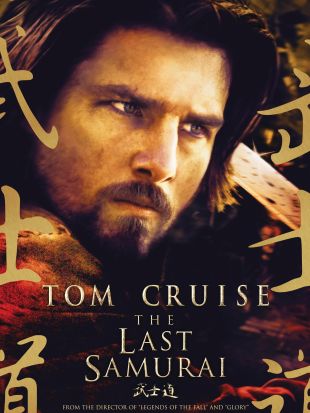
While it certainly is not groundbreaking or original, Edward Zwick's The Last Samurai does succeed in telling a moving story in a well-crafted manner. With similarities to Dances With Wolves and Zwick's own Glory, the film also tries to capture the magic of such classic samurai films as Kurosawa's The Seven Samurai. But the skewing of the story to reflect the experience of a Western intruder/visitor unfortunately places the audience somewhat outside of the full experience of the samurais themselves. Occasional voice-overs with Tom Cruise's Algren reading out diary entries are a much too overt plot device that takes away from the film's more subtle, restrained storytelling elements. The sometimes slow pacing of the film can feel overdone at times, but it is more often very effective in creating the emotional impact of the story. Cruise acquits himself well in his role, portraying his Captain Algren passionately and showing a flare for swordplay and fighting skills in the action scenes. But off of the battlefield, Cruise never really seems to embody a character that has truly experienced what Algren has; one does not get the sense that he is a battle-worn veteran (of the Civil War and the Indian Wars in the West). This is the kind of movie that works best when its actors are able to summon the period authenticity of their characters and to disappear into their roles. Though Cruise gives the part his all and conveys emotions well, he doesn't seem to have the right presence for the part.
The real stars of the film are its Japanese actors, even if it does relegate them to "supporting" roles. Ken Watanabe is stoic yet heartbreaking as the samurai leader Katsumoto, truly conjuring the essence of samurai/warrior life. Watanabe should be considered among such greats as Toshiro Mifune and Takashi Shimura. He is incredibly effective as Katsumoto, and his are the best scenes in the film. Also impressive is Hiroyuki Sanada as a fierce and highly skilled samurai and Shin Koyamada as Katsumoto's son, Nobutada, who shows great courage and heart in one of the film's most moving scenes. Koyuki, who has the only real female role in the film, does as much as she can with her part as Taka, the widow of a samurai whom Algren has killed and the sister of Katsumoto. Taka must care for Algren and nurse him back to health after a battle injury, and Koyuki expresses a lot with few words as her character goes from feeling shamed by Algren's presence in her home to harboring a subtle affection for him. Lastly, the young child that plays the older of Taka's two sons delivers a touching performance; he develops a natural rapport with Cruise's Algren, especially in a later scene in the film in which he reveals his emotional attachment to the American captain.

The cinematography for The Last Samurai and its production design are excellent, expressing a poetic respect for the Japanese culture, land, and history. Algren's samurai training scenes and many fights are choreographed and shot with great skill and are rousing pieces of action. The battle scenes are also photographed and edited with flair; however, though they are stirring and beautifully shot, most are so heartbreaking that their effect is bittersweet. The battles seem authentic and are often bloody; special effects and stunts are worked in seamlessly, not taking away from the film's elegant style. Attempts at political explanations for the state of affairs are so-so. Masato Harada is adequate as the emperor's greedy advisor Omura, personifying the "selling out" of Japan to the West, but too much is left unsaid about how the country has gotten to this state of, essentially, civil war. It's the meeting between Katsumoto and the young emperor (Shichinosuke Nakamura) that elucidates the two men's plights and gives their standpoints a greater amount of emotional weight. Overall, The Last Samurai tells a fascinating and moving story despite its flaws.
